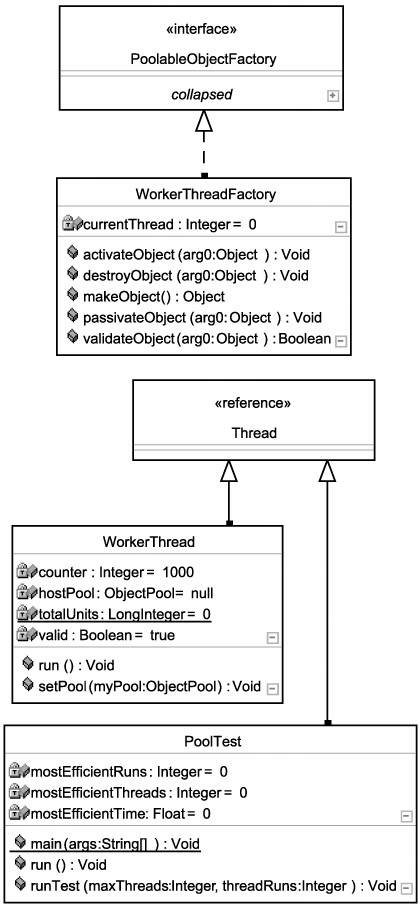Thread Pool Example
|
| Java features a powerful, rich set of services for working with multiple threads. In this example, we will use the Pool suite to manage experimentation with the built-in Java threading facilities. As shown in Figure 5-3, a WorkerThreadFactory can be used to provide new test thread objects. Our main application code, PoolTest, creates a suite of test threads, testing how long it takes to complete the test run in different combinations of threads and thread runs. Figure 5-3. Thread pool example classes. By changing the behavior of the WorkerThread.run() method, we can change the load placed on the system by each thread, and by changing the values of the PoolTest.runTest() method, we can determine different results when different thread loads are placed on the system. For example, by comparing the impact of 1,000 threads running once against a single thread running the same task 1,000 times, we start to understand the overhead of parallel execution on a single system compared to serial execution. Listing 5-1 shows the main class for this example. Pay particular attention to the configuration of the GenericObjectPool object in the runTest() methodnotice that several important configuration methods are used to set the operation of the pool. You'll also notice that in this example, runTest() borrows objects from the pool but doesn't return themthe WorkerThread objects return themselves to the pool when execution is complete. Listing 5-1. Thread Test Runner package com.cascadetg.ch05; import org.apache.commons.pool.impl.GenericObjectPool; public class PoolTest extends Thread { /** This main method simply creates a new PoolTest thread * and starts it. */ public static void main(String[] args) { new PoolTest().start(); } /** The run() method (called when the PoolTest thread starts) * merely executes a series of test in serial fashion. */ public void run() { runTest(30, 30); runTest(100, 100); runTest(1000, 1000); runTest(1000, 2000); runTest(1, 3000); runTest(10, 3000); runTest(30, 3000); runTest(1000, 3000); System.out.println("Most efficient @" + mostEfficientTime); System.out.println( "(" + mostEfficientThreads + "/" + mostEfficientRuns + ")"); System.out.println("Done."); } /** Used to keep track of the most efficient run */ int mostEfficientThreads = 0; int mostEfficientRuns = 0; float mostEfficientTime = 0; /** This method actually runs the test. The higher the * maxThreads value, the more threads can be created to run in * parallel. The threadRuns indicates the total number of * threads that will be created. * * @param maxThreads Used to specify the maximum number * of threads to be created by the object pool. * * @param threadRuns The number of executions of the thread * to be run. */ public void runTest(int maxThreads, int threadRuns) { System.out.println( "Starting " + maxThreads + "/" + threadRuns); // Create an instance of our WorkerThreadFactory. WorkerThreadFactory myFactory = new WorkerThreadFactory(); // Here, we create a generic object pool, passing in our // WorkerThreadFactory. GenericObjectPool myPool = new GenericObjectPool(myFactory); // Here, we configure the behavior of our pool. // Note the use of maxThreads to configure the number of // threads we want to allocate, and the behavior of the // threads. myPool.setMaxActive(maxThreads); myPool.setWhenExhaustedAction( GenericObjectPool.WHEN_EXHAUSTED_BLOCK); myPool.setTestOnReturn(true); // Gather the current timing info, and start making // threads. Note that this will block if there is no // thread available. long currentTime = System.currentTimeMillis(); for (int i = 0; i < threadRuns; i++) { try { WorkerThread myThread = (WorkerThread)myPool.borrowObject(); myThread.setPool(myPool); myThread.start(); } catch (Exception e) { e.printStackTrace(); } } // Now, make sure that all of the threads we kicked off // have a chance to finish up what they are doing. while (myPool.getNumActive() > 0) { yield(); } // Let's do some reporting of the results. long time = System.currentTimeMillis() - currentTime; System.out.println( "Total created threads:" + myFactory.currentThread); System.out.println("Seconds Elapsed: " + (time / 1000f)); System.out.println( "Completed: " + WorkerThread.totalUnits); float efficiency = WorkerThread.totalUnits / (time / 1000f); System.out.println("units/second: " + efficiency); // If this is our most efficient run, we should note that. if (efficiency > mostEfficientTime) { mostEfficientTime = efficiency; mostEfficientThreads = maxThreads; mostEfficientRuns = threadRuns; } System.out.println(); // Reset the work done by the threads for the next test. WorkerThread.totalUnits = 0; } } |
|
